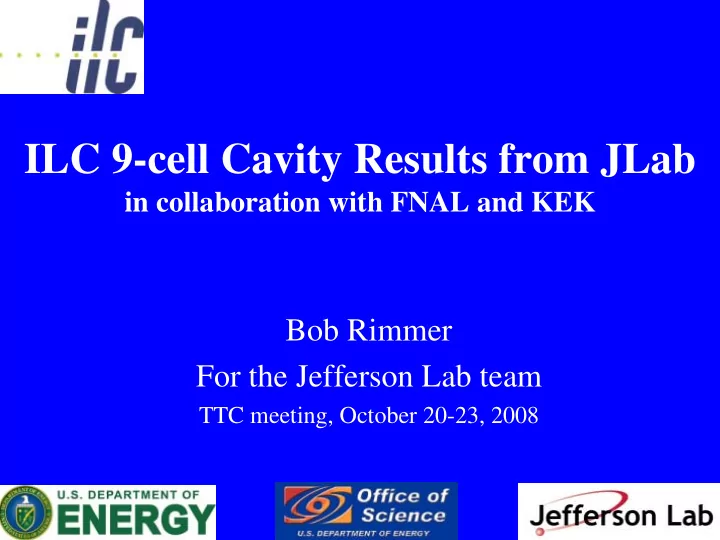

ILC 9-cell Cavity Results from JLab in collaboration with FNAL and KEK Bob Rimmer For the Jefferson Lab team TTC meeting, October 20-23, 2008
New 9-cell Results Since SRF2007 Bob Rimmer TTC meeting, October 20-23, 2008 2
New 9-cell Results since SRF2007 (cont.) Bob Rimmer TTC meeting, October 20-23, 2008 3
2 Year Overview of 9-cell Activities at JLab • 12 cavities EP processed, RF tested. • 114 hour active EP time. • 30 EP & 30 VT cycles done in FY07 • 17 EP & 27 VT cycles done in FY08 (more VT in 08 for understanding FE and quench). Results published at SRF2007 & LINAC08: 1. R.L. Geng et al., “Latest Results of ILC High-Gradient R&D 9- cell Cavities at JLAB ”, SRF2007, Beijing, China, October 2007, WEP28. 2. R.L. Geng et al., “High-Gradient SRF R&D for ILC at Jefferson Lab”, LINAC08, Victoria, Canada, September 2008, THP042. Bob Rimmer TTC meeting, October 20-23, 2008 4
2008 as compared to prior year Progress made toward reaching 35 MV/m after 1 st light EP ( data sampling of cavities by qualified vendor ) Jan Mar 07 Nov 07 Jul 08 Jul 08 Aug 07 08 Cavity A7 A6 A8 A12 A15 A11 Yield Eacc ≥ 31.5 MV/m? Y Y Y Y N Y 5/6 (83%) S0 cycles needed 2 4 3 1 - 1 Eacc ≥ 35 MV/m? Y Y N Y N Y 4/6 (67%) S0 cycles needed 2 4 - 1 - 1 Relevant improvements made toward optimal processing with JLab facilities • Initial acid mixing volume ration 1:10 (HF(49%):H2SO4(98%)) • Nominal voltage 14-15 V • Continuous current oscillation • Minimum purging N2 gas • HPR after bulk EP and before 600 C furnace heat treatment • … Bob Rimmer TTC meeting, October 20-23, 2008 5
Understand Gradient Limitation when Quench is Hit in Real 9-cell Cavities 1. Pass-band measurements determine quenching cells. So f ar, only t wo candidat e cells need at t ent ion in act ual • quench limit ed 9-cell cavit ies 2. Second test with T-mapping near equator of 2 cells. 3. Visual inspection with long-distance microscope 9-cell cavity inspection apparatus. Bob Rimmer TTC meeting, October 20-23, 2008 6
A15 gradient limit at 19 MV/m: T-mapping found a hot spot correlated to quench Long distance microscope identified a defect near hot spot To EBW seam A pit outside equator EBW 200-300 µm at boundary of heat affected zone Bob Rimmer TTC meeting, October 20-23, 2008 7
More on cavity inspection • Observe & document features on as-built surface (already started with A13, J1 and J2). • Track notable features along with cavity processing steps. • Find quench location with T-mapping and re-inspect. • Goal is to establish correlation between relevant defect and quench. • Initial data point out the importance of heat affected zone of EBW (equator, iris and stiffening ring). • More inspection results in later talk. Bob Rimmer TTC meeting, October 20-23, 2008 8
Field Emission • FE remains an issue. • Some cavity testing FE limited. • Many cavity testing have finite FE loading. • FE risk due to re-contamination (such as He tank dressing) remains a threat. • Understanding and improvement needed. Bob Rimmer TTC meeting, October 20-23, 2008 9
Understanding FE Behavior w/ Samples Surface studies of Nb samples EP’ed together w/ 9-cell cavities JLab Scanning Field Emission SEM • Scan Nb surface with biased tip – DC field upto 140 MV/m Nb-O • Field emission sites and I-V curve registered • Sample transferred to SEM chamber under vacuum • Nature of field emitter determined Dominant field emitters on as EP’ed Nb surface Bob Rimmer TTC meeting, October 20-23, 2008 10
Understanding FE Behavior w/ Samples Before After Bob Rimmer TTC meeting, October 20-23, 2008 11
Understanding FE Behaviors w/ Real Cavities Observation of Baking Induced Field Emission in EP’ed Cavity Bob Rimmer TTC meeting, October 20-23, 2008 12
Understanding FE Behaviors w/ Real Cavities Observation of Baking Induced Field Emission in EP’ed Cavity (cont.) Bob Rimmer TTC meeting, October 20-23, 2008 13
First Example of Reducing/Eliminating Field Emission by Re-cleaning * * Apparent reduced rate due to RF termination Before X-Ray probe reaching equilibrium More details of multiple processing and testing results can be found in JLab report at ILC SCRF meeting, April 21-25, 2008, FNAL Bob Rimmer TTC meeting, October 20-23, 2008 USC=ultrasonic cleaning 14 HPR=high pressure water rinse
More Examples of Reducing/Eliminating Field Emission by Re-cleaning A12 3 rd & 4 th RF test A12 1 st & 2 nd RF test Another example is A6: last S0 test at JLab 37 MV/m, limited by field emission. After shelf storage over a year, A6 re-cleaning (USC + HPR) and shipped under vacuum, RF test at FNAL saw an improved Q(Eacc) over the last test at JLab. Bob Rimmer TTC meeting, October 20-23, 2008 15
JLab Electropolished & Tested 12 of 14 (85%) US & US/Japan 9-cell Cavities J2 “qualified” vendor Graph credit: Camille Ginsburg, FNAL Bob Rimmer TTC meeting, October 20-23, 2008 16
Bob Rimmer TTC meeting, October 20-23, 2008 17
Bob Rimmer TTC meeting, October 20-23, 2008 18
Recommend
More recommend